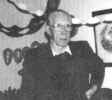Emory L. Hamilton

Memorial Tribute
by Rhonda Robertson
Emory L. Hamilton, born April 10, 1913 in Wise County and christened Emory Lee; he was the son of Jessee and Sarah Baldwin Hamilton. His love of history began at the feet of his
parents, aunts, uncles and grandparents listening to stories of his ancestors told around the fireplaces and porches of Wise County. Emory was a descendant of the earliest of pioneer families having settled on the frontiers of Southwest Virginia.
He often told of himself and his younger brother, J. B., studying by candlelight in the loft of their old log house in the community known as Hamilton Town. They poked holes in the daubing in the walls and roof so they could lie in their beds beneath feather ticks and look at the stars glinting in the dark sky. Beautiful as this was there was a drawback, and he laughingly told that in winter the snow would sift down through the openings and softly fall on them, making them keep their heads under the cover all night because they didn’t dare tell their parents what they had done.
When Emory graduated from high school there weren’t many opportunities for young men in Wise County so he traveled to New York to study navigation with the Merchant Marines. It was while living in New York and working on board the Merchant ships that the Depression came and everyone lost their jobs causing his return home to Wise. He worked odd jobs until he applied for and was accepted by the WPA. his assignment was to document and record the early settlements of Wise County. The only problem was that his investigation and recording of these settlements was limited by how far he could walk or with whom he could hitch a ride. The assignment only fueled his love of history and from this work came his manuscripts of Indian Atrocities Along the Clinch, Powell and Holston Rivers, The Early Frontier, Early Settlements and Early Houses. In addition to the hundreds of articles that appeared in various publications ad local newspapers.
After his enjoyable work in the WPA, World War Ii came and Emory enlisted in the Army Air Corps on January 14, 1941 at Roanoke, VA and trained as an Administrative Specialist, being promoted to Technical sergeant in the 3539th Base Unit. He transferred on January 23, 1942 to Australia, and then on to the battles and campaigns of New Guinea and the Northern Solomons.
Emory related that it was so hot everyone had to sleep outside at night n hammocks strung between the trees. These hammocks were covered with netting that not only served to keep out the mosquitoes, but he also told that at night, things would fall out of trees onto the netting and roll onto the ground. Those things were snakes! Emory reenlisted in the 309th Army Air Force at Greenville, South Carolina on November 19, 1945 and was discharged from the service on January 11, 1947 in Greenville. He might have made a career out of military service, but he returned to care for his widowed mother.
When Emory returned home he worked for several years in the County Circuit Court Clerk’s office until a position opened in the Wise County Vocational School where he taught sheet metal and drafting until his retirement. Many are the men who took drafting and sheet metal under his tutelage.
Emory was a founding and charter member of the Historical Society of Southwest Virginia and served as its secretary for 30 years before giving up the position due to ill health. Emory answered hundreds of letters and phone calls each month from people searching out their family genealogy and the early history of Southwest Virginia. Had Emory lived to see the beginning of the Wise County Historical Society he would have been one of its most avid supporters and would have been in the office daily to answer questions and help out. He took great enjoyment in helping people in their quest and was a fount of knowledge which is sorely missed and cannot be replaced.
From his love of history came his passion for antiques and he had a most impressive collection of porcelain mustache cups and pattern glass pitchers and creamers. His pitchers and creamers are on display at the lonesome Pine Regional Library.
Along with his keen interest in history and genealogy, he also had a great interest in astronomy and harbored a secret desire to have been an archaeologist.
Emory contracted cancer of he lung, which recurred after a short remission and passed away on November 3, 1991 while hospitalized in Kingsport, Tennessee. He is buried by his mother and father in the Wells Cemetery in Esserville, VA
I Like to think of him like Indiana Jones, in a leather jacket with a battered fedora, turning to doff his hat in goodbye as he prepares to stride off to a new adventure.
Memorial Tribute to Emory Hamilton
by Rhonda Robertson
Do Not Stand At My Grave and Weep
Do not stand at my grave and weep,
I am not there, I do not sleep.
I am a thousand winds that blow,
I am the softly falling snow,
I am the gentle showers of rain,
I am the fields of ripening grain.
I am in the morning hush,
I am in the graceful rush,
Of beautiful birds in circling flight,
I am in the starshine of the night.
I am in the flowers that bloom,
I am in a quiet room,
I am in the birds that sing,
I am in each lovely thing.
Do not stand at my grave and cry,
I am not there, I do not die.
Mary E. Frye
1932